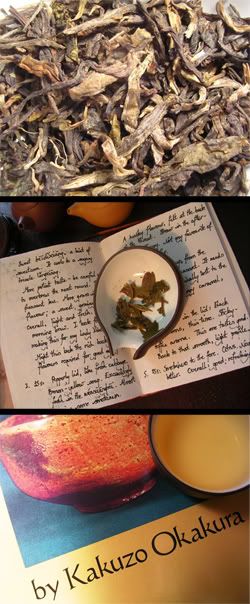 Recommended by Scott, the gentleman behind Yunnan Sourcing, this shengpu was $15/bing.
Recommended by Scott, the gentleman behind Yunnan Sourcing, this shengpu was $15/bing.Haiwan factory itself was set up by a retired manager from Menghai Factory, one Zhou Bingliang, in 1999. Scott mentioned that he sited the nascent Haiwan Factory in his town of Anning, due to its famous water quality and hot springs. Scott also cites his experience that the Haiwan Factory is the cleanest that he has visited. I've a fairly clear idea of the general level of hygiene in tea factories...
This claims to be an early spring tea from, as Fate would have it, 700-year-old tea trees. Quelle surprise!
 Dry leaf:
Dry leaf:Dark and small (clearly picked in spring), yet whole, the leaves are easily separated, and look rather appealing. The aroma is very quiet, however, being merely sweet.
A consequently high, sweet aroma is followed by a stable, enjoyable mushroom flavour. It has a somewhat melon-like fruity edge, without being so much as to cause me suspicion over its production.
There is a fair quantity of light tea-oil on the lips and tongue, which I find often helps to point to good leaf quality, with a strong ku. The potency of the ku somewhat obscures a base of low, tobacco flavour.
However, by the third infusion, the tea becomes much more simple, and tends towards a gentle sweet-straw character. The huigan is not pronounced, but at least present.
Wet leaves:
Healthy and small, they are quite well-treated by Haiwan.
Overall:
Refreshing, light, but somewhat simple. It isn't worth going out of the way for this tea, but is pleasant nonetheless. Not one of the classics.
If anyone has any information at all on Yushou Mountain, I am all ears - I cannot find mention of it.

Welcome back Dr. Clifton. I trust the thesis is in a more manageable state?
ReplyDeleteYour posts were sorely missed.
Top o' the mornin' to you, Big Dave - thanks for the kind words.
ReplyDeleteI just realised that writing up my notes is a good break from writing up my experiments, so maybe I can continue the trend. :)
Toodlepip,
Hobbes